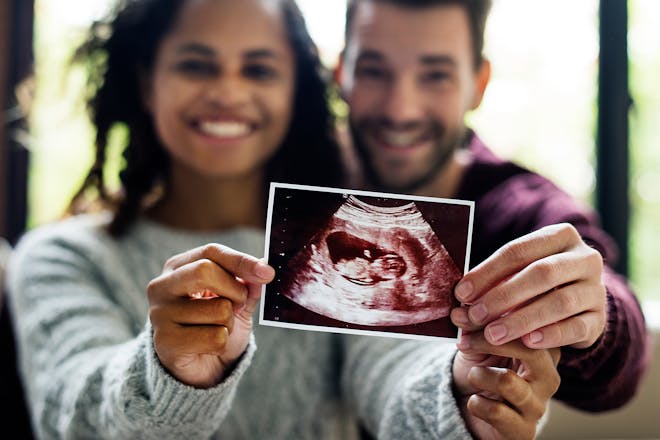Can I tell if I'm pregnant by feeling my belly?

This page contains affiliate links, which means we may earn a small amount of money if a reader clicks through and makes a purchase. All our articles and reviews are written independently by the Netmums editorial team.
Have you heard that you can feel your stomach to see if you're pregnant? Read on to find out the facts, including when you can feel your baby move from the outside and how to tell if you're pregnant during the early stages.
If you think you could be in the early stages of pregnancy, you might be wondering how to feel your stomach to see if you are in fact pregnant. Here's what you need to know...
Feeling your belly from the outside
There are a lot of stories out there but, unfortunately, it's not possible to tell if you're pregnant by feeling your stomach or belly from the outside in the early stages of pregnancy.
Later on in pregnancy, it may be possible for you or others to feel your baby moving by touching your belly from the outside, and you will start to develop a feel-able baby bump – but these things won't happen until much later down the line, around the middle of your pregnancy.
FREE NEWBORN NAPPIES
By this point, most people will already know they are pregnant anyway, either by taking a pregnancy test and/or because they've noticed pregnancy symptoms and changes to their body.
How your belly might feel on the inside
While you won't be able to tell that you're pregnant by physically touching your stomach in the early stages of pregnancy, there are some early pregnancy symptoms which you may feel internally in your abdomen area, and these could give you an early sign that you're pregnant.
These signs include:
- period-type pains (but no period)
- cramping or bloating in your belly
- feeling nauseous or sick
You'll also start to feel your baby moving inside but, again, this won't happen until later on in your pregnancy. The earliest you're likely to feel your baby move from the inside is at about 16 weeks. However, some women don't feel their baby move until 24 weeks. If this is your first pregnancy, you might not feel any movement until after 20 weeks.

When you do feel your baby moving, this might feel like a gentle fluttering or swirling feeling at first, and as your baby gets bigger you'll start to feel kicks and jerky movements – or even hiccups!
As your pregnancy progresses, other people will be able to feel your baby moving by touching your belly from the outside too. The point when this is possible will be different for everyone, so be patient and eventually it will happen!
What are the early signs of pregnancy?
While you won't be able to feel your stomach to see if you're pregnant during the early stages of pregnancy, there are some early symptoms that it's possible to experience in the first few days or weeks after conceiving, and before a missed period.
These can include:
- Period-type pains (but no period)
- PMS (cramping, bloating, headaches, heartburn, indigestion, feeling overly emotional)
- Brown discharge
- White discharge
- Spotting
- Sore, tender or tingling breasts
- A metallic taste in your mouth
- Tiredness
- Nausea and sickness
You can find out more about the early signs of pregnancy here.
Of course, the best way to know you're pregnant for certain is to take a pregnancy test.
When to take a pregnancy test
You'll ideally want to take a pregnancy test from the first day of your missed period. Some modern pregnancy tests claim to give accurate results before your period is due, but waiting until you've missed your period will usually give you the most reliable answer.
Find more information on how soon you can take a pregnancy test here.
What to Expect When You're Expecting by Heidi Murkoff is a must-read for all expectant parents. Packed full of advice, it has over 15,000 positive reviews on Amazon! See more details here.
A full body pregnancy pillow will keep you comfy at home; during sleeping and relaxing and it can be used to support you during breastfeeding when your baby arrives. See Dunelm's wide variety of pregnancy pillows here.
Looking for more information on what to expect during pregnancy? Read our articles below or share advice with others in the forum.





